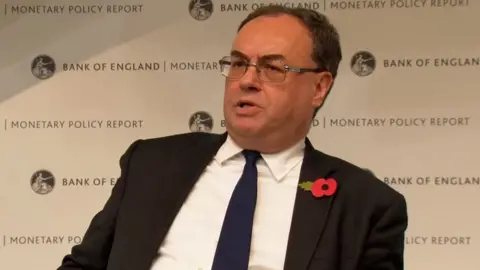Who is to blame for soaring prices?

 Getty Images
Getty ImagesThere was nothing more certain than a blame game erupting about the cost of living crisis.
The Bank of England's target in law is to get inflation to 2% on the Consumer Price Index measure, but it is now heading for 10%.
It is a clear and rather spectacular failure on that score.
The target is supposed to apply at all times and the setting of interest rates is supposed to be consistent with the target in two years' time.
But at the same time, the great bulk of the factors underpinning inflation surging to a 40-year high is beyond the control of the Bank.
The pandemic, the supply chain fails as the global economy rebounded, the introduction of post-Brexit trade frictions with Europe, the post Brexit and pandemic fall in labour supply, the fall in sterling, and of course Russia's invasion of Ukraine have all impacted on rising prices.
Only today world wheat prices and UK diesel and petrol prices are close to or at record levels, in the aftermath of Russia targeting Ukraine's food export infrastructure, India's export controls, and the impact of Western sanctions.
The Bank also has a responsibility in addition to stable prices "to support the economic policy of Her Majesty's Government, including its objectives for growth and employment".
This is code for "keep prices stable but do try to avoid creating recessions and unemployment".
And that is the balancing act or "the very narrow path", as the Bank's governor Andrew Bailey put it to me, that the Bank always faces. It is just far more difficult when dealing with three external shocks and a fall in sterling.
 Bank of England
Bank of England The real critique of the Bank is that by acting slowly, inflation will now be entrenched and fall back from high levels only slowly, and require higher interest rates, even at the risk of a recession.
The warning signs were there in the housing market last year of an extraordinary pandemic housing boom. The Bank chose to analyse these surges as mainly justified because the pandemic had caused people to want to move house, rather than signs of something unsustainable.
Friends of the Bank say that the monetary policy committee structure, where five Bank insiders and four external experts debate interest rates every six weeks or so, make it difficult to turn the tanker around. All the members of the committee issue speeches including lengthy justifications of the previous month's votes. The committee structure could make it more cumbersome to effect rapid policy change.
It happens to be that this is occurring on the 25th anniversary of the Bank of England given the independence to set interest rates, without political interference.
The reason for that was economic theory and practice had shown that the politicisation of interest rate setting was itself inflationary. Governments have an incentive to let the good times roll, slash interest rates, and stoke unsustainable booms just before an election. Taking the power to set interest rates away from politicians, had largely been a success, in the first half of that.
Some of that success, however, was down to the rise of China as workshop of the world, reducing global prices, by making manufacturing cheaper. Those global deflationary factors are now in reverse. The world economy has had sand thrown in the wheels, with trade embargos on wheat and energy. The UK in particular is in the middle of post-Brexit trade transition, where imports and exports trade less freely, and it is more difficult to access European labour. That is, for now, also adding to long-term price pressures, and makes the Bank of England's trade offs worse.
The Bank has some serious questions to answer, that might yet lead to a rethink of its independence settlement. But there is enough blame for the cost of living crisis to go around all arms of officialdom. And those in government piling political pressure on the independent "Lady of Threadneedle Street" may want to be careful with what they are wishing for.
